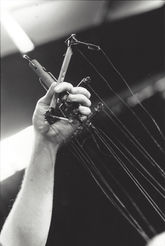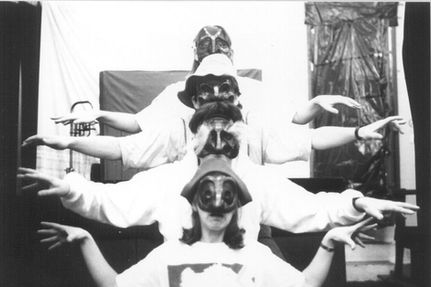Professional Training
Masks, puppets, magic and performing objects are tools of transformation. They are a kind of seismograph of the consciousness that we have of ourselves and others. The creative nucleus of SMPC is our theatre, museum, education unit and related production and design workshops. Our approach is ‘hands-on’ and our work and training initiatives are applied by ‘learning through doing’ from craft to performance.
The Centre has an extensive library of mask and puppet books and related art forms (theatre, visual art, music, dance, storytelling) and ample documentation and archive resources related to our special collections.
Scottish Mask & Puppet Centre Training
Training for the puppet theatre can take many forms; prior to the twentieth-century, training in the use of masks and puppets was often accomplished through passing down skills within families, clans or tribes from one generation to the next. The “initiation” system still operates in many parts of the world, where the student is expected to serve as an apprentice (Wayang, Bunraku, Kathakali, Punch & Judy, Pulcinella). However, modern apprenticeships are undertaken with contemporary mask and puppet companies and often reflect the style and limitations adopted by those particular companies.
Professional training cannot be limited to a three or four-year course but must continue throughout life. A first stage training may well take place at a college or university. A second stage training should take the form of an apprenticeship(s) over the course of a decade. A third stage training which may be defined as approaching mastery in certain areas would take place over the course of the next decade and start to constitute life-long learning. In Japan, this three-stage process was likened to the opening and ripening of a flower by Zeami.
Puppeteer Training
At SMPC, we delivered an HND in Puppet Theatre Arts with Anniesland College, Glasgow, during 1995 - 2004. This was a two-year vocational training course designed to work at the first stage level.
At present, professional training takes the form of one-to-one mentorship in specific skills, knowledge, background and experience. We offer a consultancy service to those interested in learning more about professional training and formation. In addition, we occasionally provide for internships or training-on-the job when new productions or commissions are in train. We aim to "kindle the joy of life, even in a stick" (Adam Killian, Theatre Lalka, Warsaw).
SMPC promotes the use of the mask as a central tool in actor-training. Research into the great traditions shape our work. These traditions include; Ancient Greece & Rome, Medieval, European Folk and Carnival, Japanese Noh, Balinese Topeng, Korean Mask Dances, tribal performance, and contestation and political action.
Dr Malcolm Knight gained his PhD from the University of Glasgow in Mask Praxis: Theories and Practices of the Mask in Modern Drama in 2005. He has made an extensive study of mask performance, mask-making, and mask traditions over a thirty-five year period, specialising in Neutral, Commedia and Noh masks and training with mask masters Carlo Boso and Stefano Perroco, I Nyoman Wenten and Nohzin Suzuki.
Actor Training
At SMPC, we take the view that, while we may all be born with the ability to animate masks and puppets, this ability must be developed and supported by a belief – a Credo. We espouse the idea that the “genius” of the people is transmitted through popular and radical traditions that engage with masks and puppets. We do not advocate fixed psychological prototyping and are opposed to gender discrimination. The personality and authority of the teacher are used to enable students to take their own path towards the art of masks and puppets through an exchange of experience.
Those seeking a vocation in the medium would be wise to work within a company first and to experience teamwork before going solo (in order to avoid being trapped in one style, medium or production technique).
A useful starting point is to consult works written by mask and puppet performers themselves such as Obraztsov’s My Profession, Miles Lee’s Puppet Theatre Production and Manipulation and Jean Louis Barrault’s Memories for Tomorrow.
There is also a great deal to be learned from coming to terms with the benchmarks set by other countries and traditions; and from seeing as much high-quality mask and puppet work as possible while simultaneously visiting museums, galleries, exhibitions, concerts, shows and libraries.





